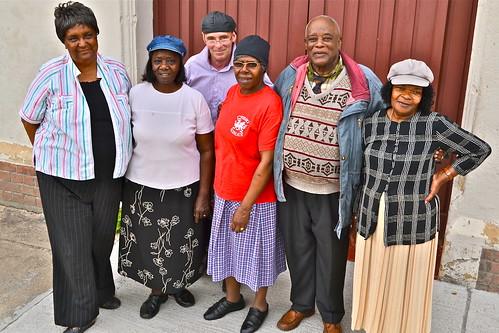
Mrs Violet Ellis, Mrs Doris Anderson, Keith Mitchell, Mrs Sylvia Johnson, Mr Ewart Walker, Mrs Veronica Harris
RADICAL changes to the way social care is funded are leading more and more providers to set up co-operatives in a bid to face the challenges of personalisation budgets head-on.
Forced to adopt a more business-like approach to care delivery, and facing increased competition from larger care providers, voluntary organisations and smaller companies are finding strength in numbers under the co-operative banner.
In Gloucester, three voluntary organisations that provide care for black pensioners have formed a consortium co-operative, making them large enough to fight off competition from larger rivals, while sharing administrative costs.
Golden Years, which runs a home care service and lunch club; Black Elders Day Centre, which also provides some home care services; and Ebony Carers, which provides counselling and advocacy as well as care services, all lost their modest council grants after the introduction of personal budgets.
The three organisations have a combined volunteer force of 30, and look after 60 elders in the city.
Having worked in harmony for a decade, they decided to formalise their relationship and approached Co-operative Futures, which supports the foundation and growth of co-operatives and community-owned organisations, for guidance.
Co-operative Futures ran a series of strategic workshops with volunteers to help them identify a way they could survive and prosper in a radically changing social care world.
Keith Mitchell, administrator of Golden Years, explained: “For ten years the three organisations have been working in harmony, providing a variety of services to mainly elderly black people.
“When changes in funding were announced larger organisations, who are desperate to tick the BME box, started to court us and it became obvious that they wanted to absorb our services.
“We felt vulnerable – we didn’t want to be taken over and that’s not what the people we care for want either.
“We realised that unless we had the ability to compete, other organisations would tender for the services we provide. We had to adopt a far more business-like attitude to survive.”
The co-operative has been named Kalabash, which is a Caribbean percussion instrument. Because of the ease with which it can be played, the word evokes feelings of inclusivity and access.
The co-operative can be contacted via goldenyears@live.co.uk or on 01452 387522.
Jane Grindey of Co-operative Futures said: “The Kalabash story shows just how well suited the co-operative model is to businesses in the care world, and for voluntary organisations that are repositioning themselves to operate in a more business-like way in the face of personalisation budgets.”
Anyone who wants to start or grow a business that is a co-operative or community owned enterprise should contact Co-operative Futures on 0845 456 2506 or at info@futures.coop More information is available at www.futures.coop
